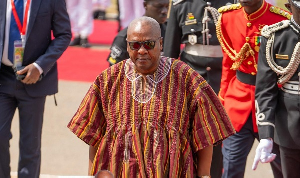-Part One
“I believe strongly and sincerely that with the deep-rooted wisdom and dignity, the innate respect and dignity, the innate respect for human lives, the intense humanity that is our heritage, the African race, united under one federal government, will emerge not as just another world bloc to flaunt its wealth and strength, but as a Great Power whose greatness is indestructible because it is built not on fear, envy and suspicion, nor won at the expense of others, but founded on hope, trust, friendship and directed to the good of all mankind (See “The Legacy of Africa’s Greatest Hero,” “All-People’s Revolutionary Party,” Sep. 21, 2010).”
Indeed, President John Mahama’s and Vice-President Kwesi Amissah-Arthur’s declaration to reach out to the public for practical solutions to address Ghana’s rising and widening economic problems is welcome news. But why now? Why is Ghana’s leadership calling for an anachronistic national conference to execute a brainstorming exercise aimed at locating innovative solutions, when, in fact, the problems, among others, are perceptibly bad leadership, lack of patriotism on the part of Ghanaians, widespread corruption, institutional incompetence, neocolonial-induced mental laziness, Fanonian dependency complex, failure of leadership to create enabling environments for scientific and technological innovativeness? Need we add more? Probably! But where exactly do we begin searching for innovative solutions? Nkrumahism! How? Simple. “Nkrumah’s legacy is a ‘blueprint’ of how to organize for revolutionary Pan-Africanism,” notes the website of the All-People’s Revolutionary Party,” adding: “to liberate Africa and ourselves from oppression, making the final step to true freedom.” This defines the first step for national and continental self-actualization.
And here is how the website describes the second stage: “We not only have detail of his practice, he also left us many books setting out a clear strategy for learning and action.” Why, then, we ask again, are we helplessly confused and hopelessly clueless? In effect, this national conference, called for by the president and his vice, should have taken place long ago, right after the overthrow of Kwame Nkrumah, to assess how best to continue Nkrumah’s progressive project of weaning Ghana and Africa from their deepening dependence on the outside world on the fluttering wings of his grand nationalist philosophy, industrialization and infrastructuralization schemes, as well as, theoretically, through his push for political and economic continentalization of Africa. Instead, Ghana’s immediate post-Nkrumah leadership, led by a political paedarchist KA Busia, uncritically, liberalized the economy by dismantling Nkrumah’s progressive project and turning over the economy entirely to the colonial masters, Busia’s long-armed collaborators in the overthrow of Nkrumah. How exactly do you become “independent” without an industrial or technological economy?
Next, the government of Busia haphazardly pursued a vicious enterprise of political and economic revenge on Nkrumah, a process that probably derived from factors having to do with Busia’s emotional deficits, political neophytism, or intellectual antiquarianism, in which case he sold off the industries and companies Nkrumah built for Ghana’s industrial sustenance to friends, cronies, and Africa’s external enemies, his friends. In the meantime, subsequent Ghanaian leadership would vigorously pursue Busia’s callous precedent. (See Kweku Dadzie’s “Sale of Government Assets,” “Center for Conscientist Studies and Analyses,” Nov. 28, 2012). These capitalistic activities reversed the course of “true” self-autonomy. Admittedly, these events constituted our first and major failure as a people. Yet, the barefaced truth is that we have never critically looked deep inside ourselves to re-discover the dancing soul of innovativeness, the tonic ocean of self-empowerment, and the romantic epiphany of self-love and, thus, behave as we do in the shadow of cluelessness!
In fact, our leaders have come to accept the exclusivity of the external world, of the non-African world, as it were, as ready suppliers of solutions applicable to African problems, which is probably why they do not innovate. Of course, there is nothing uniquely questionable about this position, as long as leaders make conscious efforts, even if wobbly, to pursue African solutions with an “independent” collective mindset. After all, originality and critical imitation represent two major pathways to developmental mobility, although the social vehicles of cosmopolitanism and globalization drive this contention. Yet, a conscious people ensure that the moral, intellectual, and spiritual deficits of cosmopolitanism and globalization do not preempt their sense of moral goodness, of community, and of patriotism. This forms part of the cultural philosophy of Nkrumahism. On the other hand, Ghanaians and Africans, especially the post-Nkrumah leadership of Africa, we strongly believe, have not fully availed themselves of the instruments of intellectual resourcefulness inhumed in the inner recesses of the “African Personality.”
What do we mean? We mean exactly what Kwegyir Aggrey once told Nkrumah, which is: “You are eagles, not chickens. Therefore arise and claim your birthright among the high heavens in the sky. Only the best is good for Africa…(See Kwesi Quartey’s “Kwame Nkrumah and the Roots of Ghana’s Pan-African Policy”). Evidently, the educationist-cum-philosopher was being figurative with the young Nkrumah. But Aggrey’s figurative statements perch on a cushioned subtext of human creativity. That is, we believe Aggrey is implicitly referring to the potential of the human for great things. But, that aside, the statements are also carefully attired in a starched philosophical poncho of layered conundrum, for he simultaneously pluralizes and singularizes “you.” Therefore, is he referring to Nkrumah as a singular ontology or as a collectivity, as Africans? Likewise, the psalmic and Garveyite rhetorical attestation of “Ethiopia shall stretch forth her hands unto God,” though may pursue a divergently interpretive pathway from Aggrey’s at face value, still identifies with the philosophical subtext of the latter’s statement, already quoted.
However, to plumb the philosophical minds of Aggrey and Garvey further, may we ask this simple question: Are eagles, as opposed to chickens, ordinarily edible? That we do not know for sure! Ideally, we may want to feed our soul and body on chickens, but fly on the intellectual strength of eagles’ aviation prowess, more so because the eagle’s range of vision and wing power are proverbial, aside being physically powerful. It is why the eagle is a popular cultural motif in many a society, ancient and modern. Further, the eagle forms part of Ghana’s and several other countries’ coats of arms. Ironically, Nazi Germany as well as Australia, to name but two, included a black eagle in their coats of arms! Nevertheless, the Australian black eagle holds a sickle and a hammer, probably recalling the extinctive brutality which Europeans meted out to the Black Aborigines of the land! That said, we may also have to acknowledge the fact that the eagle has a heavy head, the seat of consciousness. A combination of consciousness, vision, and physical power should make for creativity, if we can substitute physical power for resilience.
Interestingly, it is the combined interplay of the eagle’s powerful range of vision, fluttering wing mechanics, and heavy head, its seat of consciousnesses, that captures our attention, granted that the chicken cannot fly or see beyond the purview of an eagle’s. It is equally worth acknowledging that Aggrey uses another sentential or phrasal device “the high heavens in the sky” to connote the limitless possibilities against or within which the human mind can operate. Put another way, Aggrey is preoccupied with the boundless reach of the human mind. Then, there is also the phrase “claim your birthright among,” with the preposition “among” taking on a philosophical investiture of African singularity in the moral universe of racial or cultural plurality. Also, here, as elsewhere, there patently exists a subtextual overlap between Garvey’s “stretch” and Aggrey’s “claim.” As well, Garvey’s “God” and Aggrey’s “heavens” or “sky” are merely figurative Siamese twins. Indeed, these four pregnant words are useful for appropriation as well as for explaining how to decouple the ossified Eurocentric mentality of Africa’s post-Nkrumah ruling class from the contorted empire of psychological paleontology.
Admittedly, converting the trapped psychological resources of the human mind into tonic springs of productivity, creativity, and social upliftment of a downtrodden people for the overall betterment of humanity is the foundational message of Aggrey’s and Garvey’s moral philosophizing. That is, turning the abject living conditions of humanity is the long and the short of Garvey’s and Aggrey’s moral statements. Simply, the human mind is the “universe,” for the laws of physics cease to exist without affirmation from the human mind. The five senses, culture, language, afterlife, history, superstition, future, dwarfs, sexual appetite, doppelgangers, present, life, human behavior, deities, witches, death, angels, institutions, knowledge, wizards, natural law, devils, habits, intelligence, foreign meddling in Africa’s internal affairs, superstition, universe, and the like cease to exist without the human mind. Thus, externalities are merely internalized fixtures of the human mind. That is why we underrate the potential of the human mind to impose its will on us at our own peril, for it is simultaneously the exclusive source of man’s problems and solutions.
That is not to say Africans are unintelligent. The science is simply not there to substantiate the latter contention. If that were truly the case, the international experts who worked on the Human Genome Project (HGP) would have told us explicitly so by now. What then is the cause of the lackluster performance of Africa’s Eurocentric leadership? If the source of the problem is not mistakably genetic, then what is it and where do we look for answers? How about the outcome between the interactive socialization of the human mind and the environment? Is the environment itself not a physiological incarnation of the human mind? In that case, we may have to look at the impact of slavery, colonialism, culture, neocolonialism, globalization, international law, belief systems (religion), educational systems, economic models, institutions, multiparty democracy, habits, etc. Again, where exactly do we look? Could it be the fault of our educational system since education nourishes the human brain? If that is possibly, even remotely, the case, how do we explain the moral contradiction that, it is our very educated leaders who are destroying Africa, and, among other things, attributing their abysmal performance to dwarfs?
Who are these dwarfs? These witches? These wizards? These mallams? These pastors, evangelists, and priests? Who are these dwarfs, the superstitious source of Ghana’s free-falling cedi? Have we become so numbed by ignorance that dwarfs have taken the holy place of gravity? Where do these dwarfs live? Do they work for the World Bank/IMF or Bank of Ghana? Or own forex bureaus or Ghana Stock Exchange? Are they shadow members of Ghana’s Finance Ministry? Have they been arrested yet? And have the authorities filed charges against these dwarfs? If they already had, when is the formal prosecution against these dwarfs in a court of law commencing? What has the state in store for the lady politician who made these outrageous claims against these dwarfs? What kind of anti-gravity verdict does the yet-to-be-named judge have in mind? What if the lady politician is a spokesperson for the gravity-friendly dwarfs? And what if the dwarfs are innocent? What then becomes of the lady politician? Importantly, we should point out that the social intersection of politics, superstition, and dereliction of official responsibilities is not an exclusive trademark of black thinking.
We shall return…
Opinions of Tuesday, 15 April 2014
Columnist: Kwarteng, Francis


















